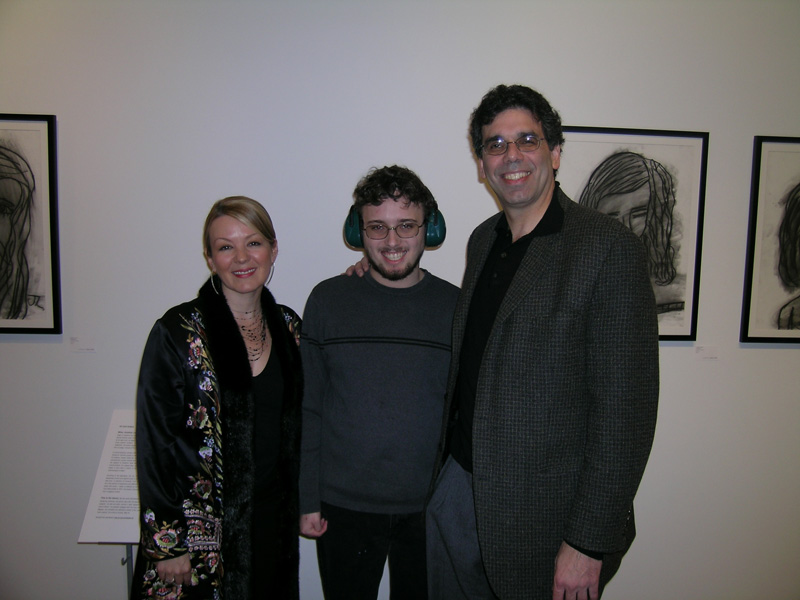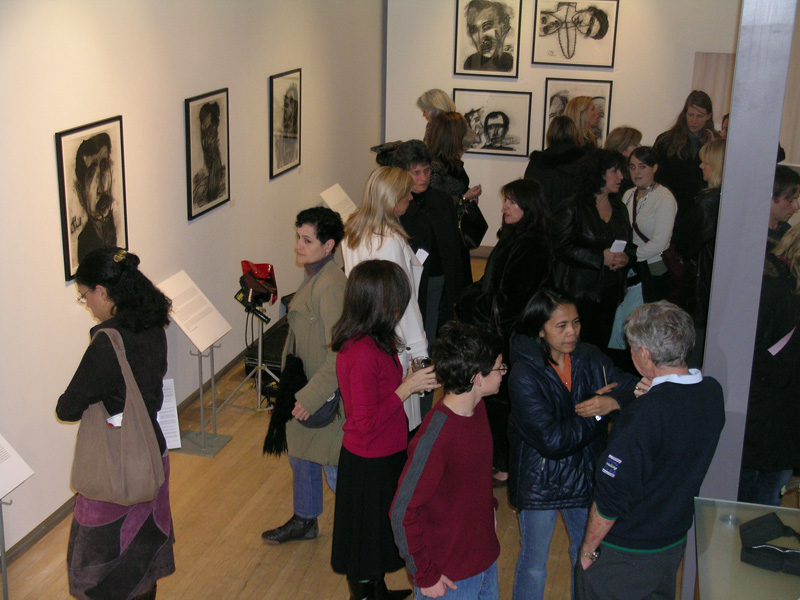DECEMBER 1 – DECEMBER 22, 2005
THE DRAWINGS OF JONATHAN LERMAN
Jonathan Lerman is an artist with autism. He is unable to converse so we cannot ask what inspires him or what triggered him to suddenly begin drawing at the age of ten. Today, at seventeen, Jonathan is prolific and shows no signs of slowing down. He has been featured in the New York Times, on The Today Show. He is in high demand because, as an artist with autism, he draws faces with uncanny insight. Publicity is not something he’s keen about, says gallery owner Kerry Schuss, his representative in New York City who bravely took Jonathan on at the age of twelve – something his colleagues in the industry felt he was crazy for doing. ‘He has trouble with crowds and cannot stop moving around. When you see him, you might think he isn’t capable of anything.’
Lyle Rexer, who wrote a book about Jonathan and also How to Look at Outsider Art writes: ‘Looking at Jonathan’s work is an affirmation that he sees everything. Working with the assurance of Matisse and the speed of Picasso, and the humour born of a cartoonist, Lerman has created an unforgettable body of work. His drawings include portraits of actual figures as well as figures from his own imagination, and rendered with great acuity. These drawings overturn the stereotype of the so-called savant artists as an unchanging talent sprung to life fully-formed. Instead, Lerman shows the detail, the restless experimentation and rapid growth of an artistic sensibility.’
Lerman is first an artist, and second, a person with autism. His drawings refute theories that people with autism are ‘mind-blind’, in other words, cannot perceive emotions or understand that others have their own thoughts. It is unusual, in fact, to find an artist with autism who draws faces with the depth of perception that Jonathan does. It therefore shows that an autistic person can have enormous capacity for perception.
As art, Lerman’s drawings stand alone. They draw the viewer in like a good novel and make us ask for more. We witness a beginning, where Lerman’s body parts are dismembered and then watch them come together like a recognition of others and of himself. Associations are made (‘The God is Wrong’) so that we wonder what meaning they have for Jonathan. Like the autistic artist Joseph Connelly who brings together multitple objects in his shadow-boxes, associations between objects carry great significance, again disproving the theory that autistic people have difficulty with symbolic thought.
Jonathan Lerman, like some other people with autism, is a person with a gift. Michael Fitzgerald, who writes about Autism, Aspergers entwined with creativity and genius writes: ‘Ever since the term autism entered the public mind, its perception has not been linked with genius and creativity. Rather, in the minds of many people, autism is associated with a very significant learning disability. A genius is a person with high ability, with or without autism, who produces a work that changes our view of a subject.’ Is Jonathan a genius or a person with a gift? At seventeen and still going, we have time to wait and see.
As a mother with a young son with autism, curator of the show, Estée Klar-Wolfond wanted to use art to to raise awareness about autism. She wanted everyone to know that lack of speech and different types of behaviour do not indicate a lack of intelligence, but quite the opposite.
Through Jonathan Lerman’s work, we can begin to see that even the most affected people are capable of thought and a unique perception. We are viewing here a ‘different sort of person’ and Estée hopes that by taking a view into Lerman’s world, we can begin de-pathologizing the phenomenon of autism and respect this community’s insights and abilities.
Curated by Estée Klar-Wolfond
http://joyofautism.blogspot.com


